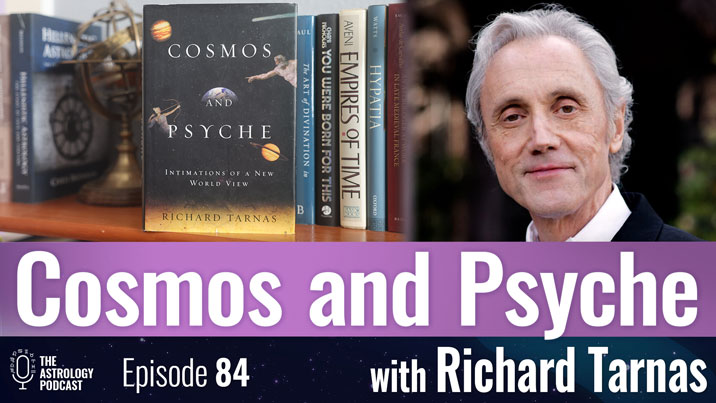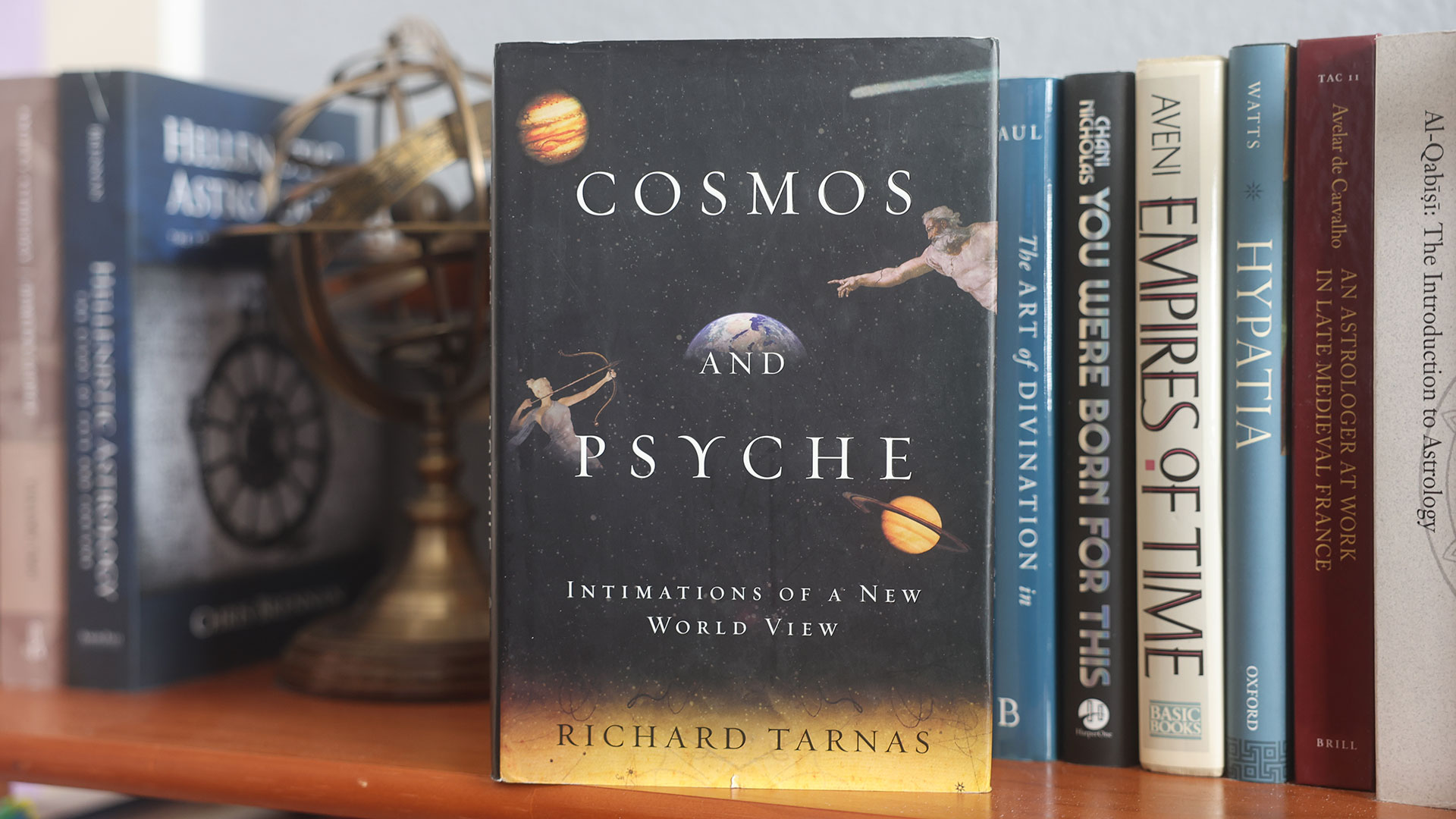
Episode 84 features an interview with Richard Tarnas about his book Cosmos and Psyche.
This landmark book was released a decade ago, in 2006, and the purpose of this episode is to give an overview of the book, talk a bit about what went into writing it, as well as discuss some developments that have taken place in the past ten years since it came out.
In particular we talk about the specific approach to astrology that has developed around the foundation that Tarnas laid with the publication of Cosmos and Psyche, which is called archetypal astrology.
You can find out more information about Richard’s work at CosmosAndPsyche.com.
Below you will find an extended set of show notes, which provides a synopsis of some of the points that we talked about, followed by links to download or stream the audio recording of this episode at the bottom of the page.
Show Notes
Most of what follows is the outline that I prepared prior to the interview, largely while re-reading Cosmos and Psyche and taking some notes in order to summarize certain points or provide a synopsis. I’m going to include most of it below even though we weren’t able to touch on every point since it might be useful for listeners who like having a written summary to go along with the audio discussion.
We ran into some issues with time, so we didn’t necessarily get to every point listed in the outline. We touched on most of the points listed below in roughly chronological order.
- Richard’s background, training, and early career
- Studying classics under the Jesuits.
- Then studying western intellectual and cultural history and depth psychology at Harvard.
- Working at Esalen Institute in the 1970s
- Initially skeptical or dismissive of astrology.
- Views on astrology changed while at Esalen. Turning point March 1976.
- Finding that people’s psychological states corresponded to their transits.
- Beginning to study birth charts and biographies and exploring astrology.
- Published The Passion of the Western Mind in 1991.
- Took 10 years to write.
- Focuses on major shifts in the worldview of western civilization since ancient times.
- Was well-received. Became standard text in university courses.
- Started as a few into chapters in Cosmos and Psyche.
- Intention was to lay the foundation for Cosmos and Psyche.
- Release of Cosmos and Psyche in 2006.
- Released in early 2006.
- Based on 30 years of research, which started c. 1976.
- From an external standpoint, the premise of the book was essentially: what if a prominent contemporary western intellectual wrote a book in which he tried to make the case for astrology, and explain what it is in a modern context while demonstrating how it works.
- It wasn’t necessarily written for the astrological community, but instead it was written in order to convince intellectuals and academics that there is something to astrology.
- The subversive nature of it in some sense, as a followup to Passion.
- Scandalous for a university professor to come out with a book that is supportive of astrology, “the gold standard of superstition.”
- Basically a brilliant book on modern astrology, and if any book was ever going to be successful in attempting to make a case for it, then this is it.
- Themes in Cosmos and Psyche
- The Copernican revolution as an analogy for astrology today.
- Imagine you made an epochal discovery that would be rejected out of hand by all the major intellectual and cultural authorities of your time.
- “The new theory conflicted not only with common sense, and not only with literal interpretations of certain passages of the Bible, but with the most cogent and long-established principles of physics and cosmology.” p. 8
- The disenchanted world view as a source of problems in the world.
- Roughly, viewing humanity as a random speck of mold living on a rock in an infinite lifeless void.
- The idea of the human psyche being embedded in a world soul/psyche (anima mundi) as part of an explanatory rationale for astro. and solution to disenchantment
- The cosmos as ensouled.
- One of the most controversial points about astrology is that it “posits an intrinsically meaning-permeated cosmos”
- Cosmos not random and meaningless. Subtle orderedness.
- The adaptation of Jung’s theory of synchronicity as an explanatory mechanism or principle for astrology.
- Expanding it so that it is not restricted to occasional or spontaneous events, but instead can be a regularly occurring phenomenon.
- Later specifies that it is a constant correspondence.
- Expanding it so that it is not restricted to occasional or spontaneous events, but instead can be a regularly occurring phenomenon.
- Presents a lot of cultural and philosophical comparisons or parallels due to familiarity with many different intellectual traditions.
- Comparing different conceptualizations of archetype in Plato, Aristotle, Jung, etc.
- Likening Neptune to mystical Christ, all-compassionate Bhudda, Atman-Brahan union, etc.
- The study of personal natal placements and transit cycles.
- Uranus cycle, Saturn cycle, etc.
- The study of larger historical epochs and cultural shifts through planetary cycles.
- Outer planet conjunctions and oppositions especially.
- 15°–20° orb.
- Uranus-Pluto cycle.
- Saturn-Pluto, etc.
- The Copernican revolution as an analogy for astrology today.
- New approach called archetypal astrology.
- What is archetypal astrology?
- It is essentially the approach to astrology Tarnas developed after studying the astrological tradition and then refined it to include the techniques and conceptualizations that seemed to make the most sense, or were seen as more reliable or plausible.
- Not unlike Kepler’s refining.
- It is essentially the approach to astrology Tarnas developed after studying the astrological tradition and then refined it to include the techniques and conceptualizations that seemed to make the most sense, or were seen as more reliable or plausible.
- A more well-articulated and theoretically consistent approach to modern astrology, which has an integrated technical and philosophical structure.
- Defining the use of the term “archetype” and “archetypal” in this context.
- Autonomous patterns of meaning.
- “…a universal principle or force that affects—impels, structures, permeates—the human psyche and the world of human experience on many levels.” p. 84
- Multidimensional and multivalent.
- Astrology is not concretely predictive, but archetypally predictive.
- Focus is not on predicting specific concrete outcomes, but discerning archetypal dynamics that unfold over time.
- Astrological archetypes capable of manifesting as internal or external events.
- Tendency to focus on psychological states.
- Expresses the importance of not limiting them to internal states though
- Dynamic potentialities and essences of meaning.
- Cites Jung in formulating the point that by their very nature archetypes cannot be fully articulated or defined.
- Fate and Free-Will
- Archetypes are participatory, and co-creative.
- Takes the multivalent nature of planetary archetypes as leaving room for free-will.
- Primary technical focus on the planetary correspondences between specific archetypal principles, and the importance of major aspectual alignments between planets.
- 1) Natal chart
- 2) Transits
- 3) World transits
- Statistics as methodologically inadequate for dealing with astrological archetypes.
- Astrological research is more qualitative than quantitative.
- It is essentially the end result of the evolution of certain forms of modern astrology
- What is archetypal astrology?
- Post-Cosmos and Psyche
- Book is still on the shelves of many bookstores
- In the philosophy section usually rather than the astrology section.
- I’ve run into many younger people who were first exposed to astrology through it.
- Book is still on the shelves of many bookstores
- Teaching at California Institute of Integral Studies (CIIS).
- Philosophy, Cosmology, and Consciousness program
- Curriculum that partially touches on astrology, among other things.
- Archai: The Journal of Archetypal Cosmology
- www.archai.org
- First issue published in 2009.
- New generation going on to explore and expand the archetypal astrology approach.
- The latest issue of Archai Journal just came out, newly helmed by Grant Maxwell and Becca Tarnas.
- Archai website also has a pretty amazing glossary for archetypal astrology.
- Miscellaneous Questions
- One podcast listener asked whether the zodiac plays any role in archetypal astrology.
- Answer was that it is not completely rejected, but plays a reduced role compared to aspects in this approach.
- To what extent does the thesis of your book Prometheus the Awakener (1995) contradict the contemporary premise that is often used to derive new astrological meanings from the names of newly discovered celestial bodies? Do you have any reservations about how this approach is being applied to new (dwarf) planets?
- Another podcast listener asks/suggests an audio book version of Cosmos.
- One podcast listener asked whether the zodiac plays any role in archetypal astrology.
- Plans for the future.
- Working on two new books.
- Recently filmed a documentary: Changing of the Gods. 2018 release.
- Closing remarks
- People can find out more information at CosmosAndPsyche.com.
Transcript
A full transcript of this episode is available here: Episode 84 transcript
Listen to This Episode
You can either play this episode of the podcast directly from the website or download it as an MP3 to your computer by using the buttons below:
Podcast: Play in new window | Download (Duration: 2:15:34 — 62.4MB)
